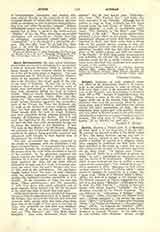

Autpert, AMBROSE, an early medieval writer and abbot of the Benedictine Order, b. in France, early in the eighth century; d. after an abbacy of little more than a year at his monastery of St. Vincent on the Volturno, near Beneventum, in Southern Italy, 778 or 779. Autpert, if forgotten today, was not without a name in his own century. Charlemagne made use of his talents; Pope Stephen IV protected him; and the monastery where he spent many years, and of which he died abbot was famous among the great monasteries of Italy. He has sometimes been confounded with another Autpert who was Abbot of Monte Cassino in the next century, and who left a collection of sermons besides a spiritual treatise. His chief work is “Expositio in Apocalypsim” (P.L., XXXV, col. 2417-52).
FRANCIS P. HAVEY

